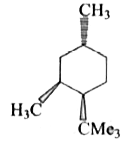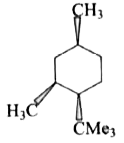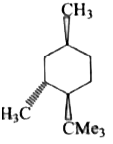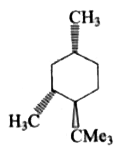What will be the heat of formation of ethane, if the heat of combustion of carbon is −xkJ ,heat of formation of water is -ykJ and heat liberated during complete combustion of ethane is zkJ
(−2x−2y+z)kJ
(−2x−3y+z)kJ
(−2x+3y+z)kJ
(−2x−3y−z)kJ
The correct Answer is:B
To find the heat of formation of ethane (C2H6), we can use the given information about the heat of combustion of carbon, the heat of formation of water, and the heat liberated during the complete combustion of ethane.
1. Write the combustion reaction for ethane (C2H6):
C2H6+O2→2CO2+3H2O
2. Balance the combustion reaction:
The balanced equation shows that 1 mole of ethane reacts with oxygen to produce 2 moles of carbon dioxide and 3 moles of water.
3. Identify the heat of combustion of ethane:
The heat liberated during the complete combustion of ethane is given as zkJ.
4. Use the enthalpy of formation for products:
The enthalpy change for the combustion of ethane can be expressed using the enthalpies of formation of the products:
ΔHcombustion=ΔHf(products)−ΔHf(reactants)
For our reaction:
z=(2ΔHf(CO2)+3ΔHf(H2O))−ΔHf(C2H6)
5. Substitute the known values:
We know:
- The heat of combustion of carbon (for forming CO2) is −xkJ, so:
ΔHf(CO2)=−xkJ
- The heat of formation of water is −ykJ, so:
ΔHf(H2O)=−ykJ
6. Substituting these values into the equation:
z=(2(−x)+3(−y))−ΔHf(C2H6)
Simplifying this gives:
z=−2x−3y−ΔHf(C2H6)
7. Rearranging to find the heat of formation of ethane:
ΔHf(C2H6)=−2x−3y−z
Final Result:
The heat of formation of ethane (C2H6) is:
ΔHf(C2H6)=−2x−3y−zkJ
C2H6+O2→2CO2+3H2O
The balanced equation shows that 1 mole of ethane reacts with oxygen to produce 2 moles of carbon dioxide and 3 moles of water.
The heat liberated during the complete combustion of ethane is given as zkJ.
The enthalpy change for the combustion of ethane can be expressed using the enthalpies of formation of the products:
ΔHcombustion=ΔHf(products)−ΔHf(reactants)
For our reaction:
z=(2ΔHf(CO2)+3ΔHf(H2O))−ΔHf(C2H6)
We know:
- The heat of combustion of carbon (for forming CO2) is −xkJ, so:
ΔHf(CO2)=−xkJ
- The heat of formation of water is −ykJ, so:
ΔHf(H2O)=−ykJ
z=(2(−x)+3(−y))−ΔHf(C2H6)
Simplifying this gives:
z=−2x−3y−ΔHf(C2H6)
ΔHf(C2H6)=−2x−3y−z
The heat of formation of ethane (C2H6) is:
ΔHf(C2H6)=−2x−3y−zkJ
Topper's Solved these Questions
Similar Questions
Knowledge Check
Which of the following has the lowest heat of combustion?
A B
B C
C D
D
The correct order of heat of combustion of the following hydrocarbon is :
AP>Q>R>SBQ>S>R>PCP>Q>S>RDS>R>Q>PWhich one of the following has lowest heat of combustion?
A B
B C
C D
D
Change in enthalpy and change in internal energy are state functions. The value of ΔH,ΔU can be determined by using Kirchoff's equation.
Calculate the heat of formation of methane, given that heat of formation of water =−286kJmol−1, heat of combustion of methane =−890kJmol−1 heat of combustion of carbon =−393.5kJmol−1
View SolutionThe gas with the highest heat of combustion is :
View SolutionThe heat of combustion of carbon (graphite) is not equal to that of carbon (diamond).
View SolutionThe standard heat of combustion of a solid boron is equal to:
View SolutionThe value of ΔH for the combustion of C(s) is - 94.4 Kcal. The heat of formation of CO2(g) is :-
View Solution
